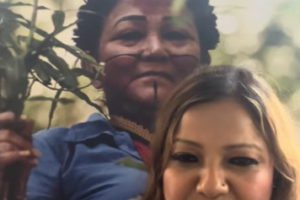Workers across Myanmar have gone on a nationwide strike, as protests calling for the release of elected leader Aung San Suu Kyi and for democracy to be restored continue for a third day.
Thousands have gathered in Yangon and Mandalay, while water cannon was deployed in the capital Nay Pyi Taw.
It comes a day after Myanmar saw its largest protest in more than a decade.
The military seized power in a coup after claiming without evidence that an earlier election was fraudulent.
They also declared a year-long state of emergency in Myanmar, also known as Burma, and power has been handed over to commander-in-chief Min Aung Hlaing.
Suu Kyi and senior leaders of her National League for Democracy Party (NLD), including President Win Myint, have been put under house arrest.
‘We aren’t going to work’
By Monday morning, tens of thousands of people had gathered in Nay Pyi Taw, with other cities also reporting significant numbers, according to BBC Burmese.
The protesters include teachers, lawyers, bank officers and government workers. About a thousand teachers have been marching from a township in Yangon towards the Sule Pagoda in the heart of Myanmar’s main city.
Online, there were also calls asking workers to skip work to protest.
“This is a work day, but we aren’t going to work even if our salary will be cut,” one protester, 28-year-old garment factory worker, Hnin Thazin, told news agency AFP.
In Nay Pyi Taw, police used water cannon on protesters and there were reports of a few injuries.
One online video of the incident appears to show protesters rubbing their eyes and helping one another after being soaked.
There were no other immediate reports of violence.
Other videos showed large crowds holding placards and chanting as they walked through the streets.
Earlier last week, Myanmar’s military seized control following a general election which saw the NLD party win by a landslide.
The armed forces had backed the opposition, who were demanding a rerun of the vote, claiming widespread fraud.
The election commission said there was no evidence to support these claims.
The coup was staged as a new session of parliament was set to open.
The military has replaced ministers and deputies, including in finance, health, the interior and foreign affairs.
It also blocked access to Facebook, which is widely used across the country, Twitter and Instagram.
But that failed to stop large nationwide protests on Saturday and Sunday – which saw the country’s largest protests since the so-called Saffron Revolution in 2007, when thousands of the country’s monks rose up against the military regime.
Source: BBC






















